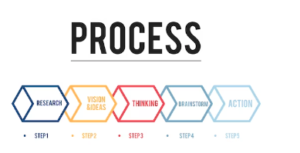Business process improvement (BPI) is the practice of analyzing, identifying, and improving business processes to optimize performance and achieve better results. The goal of BPI is to streamline workflows, reduce waste and inefficiencies, enhance quality and customer satisfaction, and improve the overall effectiveness and efficiency of an organization’s operations.
BPI typically involves a systematic approach that includes the following steps:
- Analyzing current processes: This involves identifying the current processes and understanding how they work, including the inputs, outputs, resources, and stakeholders involved.
- Identifying areas for improvement: Based on the analysis, areas for improvement are identified, such as bottlenecks, redundancies, delays, errors, and inefficiencies.
- Defining new processes: New processes are defined to address the identified issues, including changes to workflows, roles and responsibilities, and technology and systems.
- Implementing changes: The new processes are implemented and tested to ensure they achieve the desired results and improve performance.
- Monitoring and measuring results: The new processes are monitored and measured to evaluate their effectiveness and identify further areas for improvement.
BPI can be applied to any aspect of your organization’s operations, including sales, marketing, production, customer service, and supply chain management. It can also involve a range of methodologies and tools, such as Lean Six Sigma, Business Process Reengineering (BPR), Total Quality Management (TQM), and Continuous Improvement (CI).
Overall, BPI is a crucial practice for organizations that want to remain competitive and achieve sustainable growth. By continually improving their processes, organizations can reduce costs, enhance quality, and provide better customer experiences, which can lead to increased revenues and profitability.





